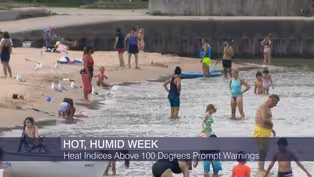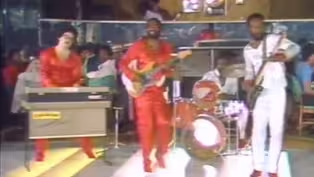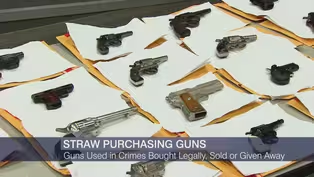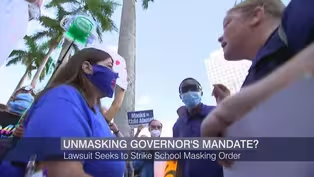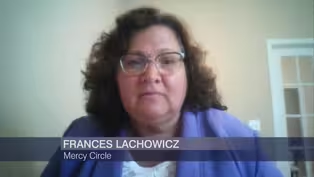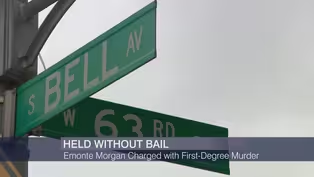
August 10, 2021 - Full Show
8/10/2021 | 56m 49sVideo has Closed Captions
Watch the Aug. 10, 2021 full episode of “Chicago Tonight.”
The latest on the two men charged with killing a Chicago police officer this weekend. Plus, arguments over the state’s mask mandate for students. And vaccine mandates for some health care workers.
Problems playing video? | Closed Captioning Feedback
Problems playing video? | Closed Captioning Feedback
Chicago Tonight is a local public television program presented by WTTW
WTTW video streaming support provided by members and sponsors.

August 10, 2021 - Full Show
8/10/2021 | 56m 49sVideo has Closed Captions
The latest on the two men charged with killing a Chicago police officer this weekend. Plus, arguments over the state’s mask mandate for students. And vaccine mandates for some health care workers.
Problems playing video? | Closed Captioning Feedback
How to Watch Chicago Tonight
Chicago Tonight is available to stream on pbs.org and the free PBS App, available on iPhone, Apple TV, Android TV, Android smartphones, Amazon Fire TV, Amazon Fire Tablet, Roku, Samsung Smart TV, and Vizio.

WTTW News Explains
In this Emmy Award-winning series, WTTW News tackles your questions — big and small — about life in the Chicago area. Our video animations guide you through local government, city history, public utilities and everything in between.Providing Support for PBS.org
Learn Moreabout PBS online sponsorship>> It was failure on federal policy to, again, sort of have such a high standard, to charge people who are doing criminal acts, that are putting guns in the hands of dangerous people and there are other policies that our research found straw purchases and trafficking and licenses requirements.
>> That's something Illinois passed in recent years.
>> Illinois has had that law but that strengthened that and states like Indiana, therefore, the entity that's doing the vetting is someone selling guns as opposed to a public agent.
We found this is a component of this and we've also found that state licensing and regulation and oversight of gun dealers and also quite critical because, frankly, of the wasn'tnesses inn federal laws.
State that fill these gaps of the problems in our federal laws with purchaser licensing and good regulatory oversight of retail gun salers have far less trafficking and less gun violence.
>> So it seems like rather patchwork of state laws, a standard uniform set of federal laws debated ad nauseum would be a better approach.
What are the tools that law enforcement have in this current climate to go after gun traffickers.
traffickers.
You saw President Biden beef that up.
>> Absolutely and whether that's criminal charges, with regard to either the source of the firearms, whether that's the dealer or whether that's the store purchaser.
>> Our thanks to both of you.
>> A look at Covid vaccine mandates in the healthcare industry.
Brandice.
>> A growing number of private healthcare and nursing care providers mandate for staff and residents.
Laggingvaccination rates to require that all employees at state operated nursing homes have the vaccine by early October and in Illinois, 84% of nursing home residents have been fully vaccinated compared to just 62% of workers according to the CDC.
Joining us now to share her thoughts is the executive director of mercy circle and this is part of the trinity health group.
We should say that we did invite several different unions that represent the healthcare workers to join this discussion, but they all declined.
Last week, they put out a statement saying rigid mandates and the employees and these congregate facilities have been on the job everyday since the onset of this pandemic and we oppose any effort to define them as a part of the problem rather than recognize stheir dedicatior dedication and protecting health and saving lives.
Francis, thank you for joining us and we should be clear that your staff at mercy circle, just so that we're certain that there's no confusion there and, first, tell us about mercy circle and the community and how many residents and staff?
>> Mercy circle has 110 units and we're pretty small in the Chicago south side.
>> OK. And how without you say the tole the toll on your residents and staff and resident families?
>> It's been a tremendous toll.
The separation from family families for our residents during the beginning of the pandemic and the peak created some very dark times for us in our industry and the impact of the unknown and the uncertainty of the virus and its impact or spread throughout, if you remember, the ederly initially was scarry.
>> What were the mitigation measures that meant going into a lockdown?
Where family and friends couldn't visit and the impact it has on residents.
>> Exactly.
So we were all -- all long-term facilities were shut down in which no visitors can come.
It caused us to be creative to find ways to keep family members and residents connected.
Things like zoom calls and face-time and window visits and drive-by parades were done by family members.
>> So I understand that 100% of your residents there are vaccinated and 90% of your staff, you all were initial just encouraging staff to be vaccinated, but trinity health, the network which you're apart umposed the vaccine mandate and what do we know what prompted the organization to do that?
>> Trinity health initiated the mandate largely because of our core value of safety, resident and colleague safety.
We just thought that was the most important thing and we should do more, so we were fortunate to have already a high participation level, but this just helps to push us to reach this.
>> Would you say the Delta varient factored into that decision?
>> I would say yes.
>> So for the unvaccinated staff, so far, what proportion would you say are hesitant to get it because they're not certain and what proportion are adamantly opposed?
>> About 7% of the staff are discerning the vaccine and although you haven't -- we did lose one staff member who was adamants about not going, but we peel that it's just so important for the safety of our community, both colleagues and residents, that it's well worth the risks involved in terms of we can overcome anything for the safety of our residents.
>> For those who are hesitant or resistants, what reasons are they giving?
>> I'll share initially, people -- most people had a wait-and see attitude.
When we were one of the first communities to be vaccinated and I think other staff members saw that most of us at that time, probably 70% had taken the vaccine and there were to severe effects and everything was going well and more and more people did the vaccine, they opted to do the vaccine and that wait-and-see accounted for a lot of people delayed taking the vaccine.
Now I think people are just still thinking about it, but the Delta varient is changing minds, as well as just seeing so many people going along with it and knowing that it's important for the safety of our community, is also a factor, and you think that weighs on people making that decision.
>> How have residents and families responded to the vaccine mandate?
>> They are extremely pleased.
If we have a positive case in the building, we have to go on lockdown again to a shorter time.
Having for vaccinated staff members and residents prevent more -- are left with the opportunities to test positive and having to shut down.
>> So going forward, you have a deadline of September 21st and you mentioned one staff member did resign rather meet the mandate and receive the vaccine, what go you think happens next?
Will some people who have taken a hard line, will they remain a part of the team?
>> We're hoping that they do and see the bigger picture here because this is not just -- it's about our whole community and greater community.
So we're really hoping that everyone does see that safety.
Again our core value and that's our most important priority.
>> Francis, thank you for the work and best of luck for the work you do at mercy circle and thank you for joining us.
>> Thank you so much.
>> Up next, a local record label brings new audiences to musicians whose work was overlooked in the past.
Stay with us.
>> Welcome to Chicago tonight, black voices and what do you believe prevents strong coalition of black and Latino forms across the communities.
>> I want to us to find a way to form together?
>> Keep the money in the community.
>> Black joy and the black experience is magical.
>> There's much more ahead on the program, including reaction to the mask mandate for students and a lawsuit trying to stop it.
But first, tucked away in the neighborhood, there's a record label in forgotten music of the past and Evan Garcia explores this.
>> Reporter: Music has been a driving force and while in college, Evan performed this band.
>> During the process of our performing, we were recording and we were getting our free recording time from Columbia college in the engineering department.
>> Reporter: In 1982, the group performed on the local variety TV show, the Chicago party.
>> We did the tune called pull-up, and the rest is history.
We had this these red satin outfits with the fringes my mom made for us and it was pretty cool.
>> Reporter: After a potential deal with Mercury records, the Chicago record label Numero group came up.
>> The main obstacle before this, is that they never put out any records and there's a very small chance.
>> Reporter: More than 30 years later, they released it to the world.
[ ♪♪♪ ] >> Reporter: They started Numero in 2003 and the label specializes in releasing music from forgotten artists of the past.
>> You have your frank Sinatrow your Pat Benatars and TR bears and his like a ship is probably a better records then Aretha Franklin's better grace, but now it's being lifted back up.
♪ nobody knows all the sorrow.
>> Reporter: Southside pastor and gospel singer has music being used in TV advertisements.
>> It is really wonderful!
But it's not just for me, but for those young people that I promised that their labor would be productive and that they would their songs on the radio.
That it would be trending and now they are telling their children and their grandchildren, that's me, I'm in the alto section and it's beautiful.
>> Reporter: Numero group released music spanning several genres from the 1950s to 2000 and online data helps to direct it.
>> In the digital space, the stats are telling us what people like and you can look at something and this has a million streamsand this artist has followers and there is an opportunity to sell a lot of albums.
>> Reporter: Gibbson says this second chance opens new doors for him.
>> I see a resurgence of old school being meshed up with the new beats and they have the technology, but they're looking for the content, and I have a full bag of content.
>> Reporter: For Chicago tonight, this is Evan Garcia.
♪ let it take you higher.
>> Numero group says their standard agreement is 50/50 agreement and you can visit more music from Gibbson, Barrett and other musicians.
Paris, back to you.
>> Treasure trove of undiscovered music.
Still to come, masks must be worn in Illinois schools, but it could be void and we talk with the attorney who filed it and a pediatrician.
As temperature and humidity spike, the Chicago area is warned of dangerous heat.
What's behind that and yesterday's storms and tornadoes.
We hear about a team of researchers exploring the different ways a 9-1-1 call could better serve people in crisis and a sculpture in Bronzeville.
But first, more of today's top stories.
The city of Chicago expandses the Covid-19 advisory.
Indiana, Wisconsin and Iowa added to the list bringing the amount of 21, plus Puerto Rico and Washington, D.C. Unvaccinated travelers coming to Chicago are urged to quarantine for ten days or receive a negative Covid test in 72 hours of arrival.
An average of 347 people in Chicago are diagnosed with the Coronavirus during the past week and anyways a 46% increase according to the city's public health data.
>>> Big changes a the top of the Chicago tribune.
The paper announces the resignation of Collin McMahon.
He capped off 34 years with the palm.
The tribune announces Mitch Pugh will take over and he was the editor of the post and courier in Charleston, South Carolina.
>>> Backpacks, penciled books and a new edition on the shopping list, a mask.
When they return, students and staff will have to wear a face covering under an executive order issued last week by the governor.
But now, a lawsuit seeks to strike it down.
We're joined with more and Amanda, who is behind this lawsuit?
>> Well, throughout the pandemic, executive orders issued by the governor have been subject to a series of challenges and several of those suits fighting were brought by attorney Tom Devour out of the metro east.
Now he has filed a new complaints and that is on behalf of a parent whose child attendsin clinton county and thd to recommend masks and not require them.
Because of the order, they have to comply.
The governor is relying on the state's emergency management act and that act does not give Pritzker this kind of authority.
>> He took it to create law because they were governing in a way he did not like.
This is what this is about, a brand new issue for the court.
>> The governor is overstepping into the legislature's job, he says.
Devour and says that's proof he can't legally do this now.
Schools can take measures like mandating face coverings, but he says, that is an issue to be taken up by local school districts and not the state and he says that.
he's acting like a tyrants and that is what parents are saying too.
>> They are furious this continuing moving the goal post is going on and saying the governor is saying your local school district does not have authority and I'll tell them what to do.
They are furious.
>> This is not just an issue in Illinois.
There have been protests and a lot of upset parents and including Texas and Florida, where, essentially, the opposite has happened, taking action against schools that do require maskers.
masks.
Here is the Florida governor.
>> We'll vindicate the rights of parents.
>> They oppose what those governors are doing, as well, arguing on a legal principle and so while the answer marking parents he represents may not like it, he says he would be filing a lawsuit against those governors, too.
Now, Dr. Taylor sergeants is a disease specialist saying she hates this mask issue is political when it's a public health issue.
>> There are many examples met with opposition.
We've had groups of people who are completely opposed to what are clear public health recommendations.
>> Those are the sort of circumstances that politicians have to get involved with.
She does understand parent's concerns as back-to-school time approaches and she hopes that churn who are of age are heading back to school with the protection of the Covid vaccine, but younger ones, like her first grade daughter and preschool son, in those schools, schools have to take preventative steps.
>> For children younger than 12, who vaccines are not an option, we have to do everything we can to minimize risk of infection and we know from the science that we learned last year, that masking is our best line of defense.
>> When the governor issued the school marking order last week, some republicans vying for the G.O.P, for next year's election, saying there is not a risk of outbreaks and kids are not at serious risk.
I asked about that.
>> Can kids get infected and we know the answer is yes.
They can get infected and transmit.
>> While the risk for serious disease is more likely in adults and especially without the vaccine, she says it can happen to youth who, by the way, are the largest unvaccinated group.
>> That doesn't mean that children aren't having severe disease, they are.
And so even though the numbers might be lower, you don't want to compare something that is so horrible as the amount of adults uneffected with something that's not good, which is the number of churn infected.
And certainly no one wants that to be their child.
>> We are still in an emergency and we can see the Delta varient is overtaking parts of the country and ICU beds are overtaking parts and it does not mean it's coming to Illinois.
Our case numbers are going up and hospitalizations are going up.
>> And the governor did not, however, directly address any of the legal arguments made in this lawsuit by attorney Devour, by the way, is running for judge.
When asked how schools are supposed to enforce this masking order, the governor said that schools have been enforcing dress codes for areas.
>> Thank you.
>> And now to Paris and the latest on a wild week of Chicago area weather.
>> Today is the one-year anniversary of the derecho storm that brought dangerous winds to the Chicago area and yesterday, there was more severe storms moving through the area as we speak right now.
And it's headed to the city.
Those come as hot and humid conditions for the next several days.
Joining us to talk about Chicago's wild weather week, Scott Collis and a professor of atmospheratic science from the university and welcome back to Chicago tonight.
Victor, we have reports it's bad out there, especially Northwest of the city and what's the latest you're hearing?
>> Well, everybody in the Chicago metro area is under a severe thunderstorm warning right now.
In fact, ten minutes ago, I had a 60 miles per hour wind gust here at my house.
After the show, I'm going to assess for tree damage.
That warning will extend until 8:30 p.m. central local and so, the Chicago metro area in downtown Chicago is still not out of the woods yet, looking at the possibilities for heavy downpours of rain, frequent lightning and damaging winds.
To clarify, you're in DeKalb.
>> Sugar Grove to the east and the storms have passed lieu.
through.
>> That area was hit and Scott, what are the factors driving the outbreak of storms and this extreme heat?
>> Well, one thing in common, the heat, hotter here holds more moisture and we have a flow from the Gulf of Mexico right now and so, just about 2° Farenheit and hotter than normal this time of year and it's the hottest that water mass gets and it's pumping moisture and heat into our atmosphere.
We don't have some of the upper-level winds that help to make these really, really bad storms, but the moment that heat and moisture is enough to keep the storms going.
>> Victor, you spotted some of the tornado touchdowns and how many did touch down and where were they?
>> I saw five tornadoes yesterday.
The national weather service right now believes seven tornadoes have been confirmed and three of those have been ratings of EF1 on the Fa generia scale, 110 miles per hour.
Those in particular, would be the sycamore and they will get EF1 and Scott is exactly right, and coming from the corner and soybeans.
And today, I think many of us in August expect the heat and humidity, but if walked outside, it was oppressively humid and Scott is right, that's what helping fuel these storms.
>> This is a term you learned when I came to Illinois.
>> What is that?
>> Corn sweat.
>> Speaking of that, we have heat indices and how dangerous is that for animals outside for long periods of time?
>> No, either of us, I think, are qualified.
I think the thing is, if you're exposed to the sunlight, not hydrated, this can overtake anybody, even those healthy, even exercising outside and we feel like we can beat it, the reality is, heat exhaustion and heat stroke are real and they kill more people every year than something like tornadoes.
>> Scott, I'll give you a stab at this, as well.
>> The heat index, and is what the heat warning is based on, a mixture of humidity and the temperature.
What it's really meant to represent is the ability for your sweat to work is when it gets muggy, it doesn't work.
So stay hydrated and stay out of the elements for the next couple of days.
>> I want to ask about a climate change report.
Scott first to you, it's likely that the earth will warm another 1.5° over the next decade and we'll have to work to keep levels Harper.
harder.
>> We're at 1.1 levels Celsius and this is an amazing report.
The language is all stark and more clear and more brutal than any other past report and science climate has gotten better and we're learning how to attribute weather to climate and the weather we see that will be a result of the increased temperatures and the other thing the IPCC did is they designed an emission's curb to keep emissions -- keep temperatures at 1.5° Celsius so there's a blueprints to affect climate change.
>> That's taking out massive levels of carbon dioxide and we can stipulate, that we don't know with any definitive proof it's tied to climate change but warming and more severe weather and what does this report portend for Chicago.
>> It's what we can do for the Chicagoland area, with heat and humidity, the report has shown the number of hot days here, compared to 1930 and 1950s has gone down because we're changing the land surface around northern Illinois.
A lot of corn and soybeans brings up the temperature.
We should see heavier rainfalls, more efficient rainfalls and this has impacts on urban flooding and agriculture across the Illinois area and there's lots to digest, including the impacts of changes like severe thunderstorms which we have seeing now.
>> We are going to keep digesting this as these storms progress and for now, our thanks to Scott and Victor.
>> Thank you.
>> Thank you.
>> And now, we toss it back to.
>> Paris, thank you.
>> 9-1-1 gets dialed for all sorts of emergencies and sometimes nonemergencies.
The university of Chicago's health lab is working to see how the nation's emergency response system can be transformed to better serve people in crisis and say 9-1-1 calls should be reframed as a public health issue and not of law enforcement.
Joining us to discuss this initiative is the director of Chicago.
Tell us about how we use, maybe overuse use or misuse 9-1-1.
>> Thank you for having me.
We think of 9-1-1 as a part of our system that's been in place forever.
That's about a half of a century old and it's one of the most heavily relied upon systems we and represents one of the campaigns that you ask a child over the age of two or three what to do in a case of an emergency and they tell you to call 9-1-1.
What's happened as a result of the way the system was designed, we made a concerted decision to couple care with enforcement.
As a result, what happens is that some people never seek care because they fear enforcement.
Other people who are in need of care receive enforcement in addition to care.
And this initiative is trying to reframe 9-1-1 as the public health and care service model that it should be.
>> On that note about some people not calling 9-1-1 because they are afraid of the kind of support they may or may not get on that call, how are communities of color disproportionately impacted at all by the use of 9-1-1?
>> You know, at communities of color, like in many issues, there are issues of systemic racism in which communities of color are over and under-protected.
9-1-1 will serve in ways in which people will call and ask for assistance but will not respond necessarily in the ways that are needed.
There are countless cases in Chicago and beyond where family members of people of color will call 9-1-1 seeking for care and assistance, specifically asking for paramedic and other sorts ambulatory care and police are sent in lieu of what families are asking for and requesting.
At the same time, community members are asking for safety and the calls for well-being are not responded to in order to ensure the right responder is responding at the right time.
That doesn't mean you need the quickest response.
Oftentimes, the fast response is the best response.
We know that many of issues in which people are calling 9-1-1 are not manifestations require longer-term well-being and care in order to be supported for communities, particularly communities of color and disenfranchised.
>> How would you say the current 9-1-1 system across the country is structured and what are some of the limitations of it?
>> One of the biggest challenges in terms of 9-1-1, there's no one way in which it's structured.
9-1-1 is composed of about 6,000 of what we call public safety answering points.
They're governed completely differently and we have not invested to make sure they're not only high performing or that we know very much about them.
It's very much a black box.
People don't know who operates their 9-1-1 center in local communities.
We're trying to open up that information and that black box through the ability to access information through our website, which is transform9-1-1.org and there are other resources to look at where that is and to determine whether your 9-1-1 center is a function of a police department, a regional authority and in some instances, it's private entities that are run by for-profit operations.
>> How might, for example, someone in a mental health crisis be better served through some sort of regioned 9-1-1?
>> Ultimately, we do not think there should be any wrong door towards care and what we would like to see more supports and professionalization in terms of call talking.
Call takers do an extraordinary job.
So every 9-1-1 center I'm aware of across the country, there are high levels of attrition.
There was a story that came out of Philadelphia that calls are unanswered because there isn't the workforce to answer them and the calls are answered and dispatched as quickly as possible rather than talking the time to understand what the fundamental underlying needs are that people have and the right responder is dispatched rather than defaulting to police response, when that may not be, in fact, the best response and when police are deployed to calls for noncriminal matters.
There's a risk that the situation can escalate.
>> We have 30 seconds left, but what could the end result of this project look like?
>> Yeah, ultimately, what we want to do is invest in the very front-end of the system, to ensure call takers have the resources they need in order to make sure that they understand the problems at hand and that there are a whole variety of responders that can be dispatched, not just police and prior EMS, but a whole fleet of community responders quick to respond to the community crisis but well positioned to do what we call second response and to make sure that after that crisis has been stabilized, people are connected to long-term care.
>> Rebecca, thank you for joining us.
>> Thank you.
>> Up next, a Bronzeville monument years in the making, but first, a look at the weather.
[ ♪♪♪ ] >> Stay inside and watch WTTW.
Why not hire a local artist whose reputation is monumental.
His works have been supported from his studio here in Chicago.
The producer caught up with him before the unveiling of a monument in bronzeville years in the making.
>> Reporter: 50 years ago, this one-time electrical substation near DePaul was converted and Richard hunts has been creating here since 1971.
>> When I got to this place in the beginning, they had taken out of the equipment, except the crane, and here you have big high ceilings, open space, to develop things in and move them around with a crane and get them out of the back door.
>> Reporter: His process is intuitive.
>> The way things work, I'll start putting things together and I have an idea about.
They'll suggest something.
>> Reporter: Some of his 21st e terrace of the art institute.
He graduated with a degree in art education.
>> One year, I was working on my income tax, I made more money selling than teaching and I decided to be a sculpture.
>> Reporter: He called this a dialogue between himself, the technique and the material.
>> It's three dimensional.
You can have a painting.
You look at it from here, there, the other side and it reveals itself in different ways.
>> Reporter: He works with steel, bronze, copper and all kinds of scrap and in the 1960s, studs asked him about it.
>> We're looking at the various works and these two statues and what's the material, and how did this come to be and what is the steel?
>> The material are automobile bumpers.
>> Reporter: Richard's sculptures can be seen from the regional library to midway airport to the loop.
His newest work is light of truth, a monument in bronze to the crusading journalist and his granddaughter spent 13 years to bring this to life.
>> We made a decision before we even contacted Richard that we wanted to have something that would not be in her likeness and we wanted it to be a monument.
It was multilayered and capturing one pose would not necessarily capture all of who she what.
The IdaB.
wells' homes were on these lands from 1941 to 2002.
A tribute needed to be given to Ida on the land, the homes once stad, which is close to the house that she physically lived in.
This is bronzeville.
>> I'm reminded of the past and then looking toward the future of this community -- >> Reporter: In the studio he's run for half a century, 85-year-old Richard hunt is back to the grind.
>> The city scape has changed, and, of course, I'm happy I've had an opportunity to put a piece here and there and it's been an important thing for me on many levels.
>> The monument is called light of truth and Richard's work is up until September 20th.
Watch our Chicago's story explore the website at wttw.com and we'll be back to wrap it up after this.
>> Chicago tonight is made possible in part by Alexandra and John Nickels and the pope brother's foundation and the support of these donors.
>> That's our show.
>> Join us tomorrow, live at 7:00.
The senate passes the $7 trillion infrastructure bill and what does that mean for Illinois in.
>> The summer program is bringing the experience to a group of city teenagers.
>> Thank you for watching and stay dry.
Maybe stay inside and have a great night.
[ ♪♪♪ ]
Chicago Area Deals with Tornadoes, Heat Warnings
Video has Closed Captions
Clip: 8/10/2021 | 7m 11s | The latest on the tornadoes that touched down west of Chicago and extreme heat warnings. (7m 11s)
Chicago Record Label Revitalizes Forgotten Past Artists
Video has Closed Captions
Clip: 8/10/2021 | 4m 45s | Older artists are getting a second chance at stardom through a local record label. (4m 45s)
How Public Health Experts are Reimagining 911 Calls
Video has Closed Captions
Clip: 8/10/2021 | 6m 33s | 911 gets dialed for all sorts of emergencies — and sometimes for non-emergencies, too. (6m 33s)
How Straw Purchasers Contribute to the Flow of Illegal Guns
Video has Closed Captions
Clip: 8/10/2021 | 7m 55s | Many guns involved in Chicago crime are bought by straw purchasers. (7m 55s)
Lawsuit Seeks to Strike School Mask Mandate
Video has Closed Captions
Clip: 8/10/2021 | 6m 27s | Frustrated parents take legal action against Illinois' mask mandate (6m 27s)
Local Nursing Home Leader Discusses Staff Vaccine Mandates
Video has Closed Captions
Clip: 8/10/2021 | 7m 7s | Almost 40% of nursing home workers in Illinois are unvaccinated against COVID-19. (7m 7s)
Suspect in Killing of Chicago Cop Held Without Bail
Clip: 8/10/2021 | 3m 3s | An update on the fatal shooting of Chicago police Officer Ella French. (3m 3s)
Providing Support for PBS.org
Learn Moreabout PBS online sponsorshipSupport for PBS provided by:
Chicago Tonight is a local public television program presented by WTTW
WTTW video streaming support provided by members and sponsors.
